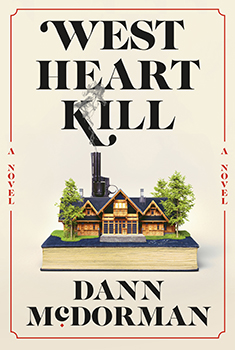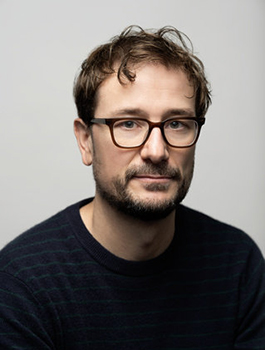

Features BookTrib Spotlight: Dann McDorman
A Murder Mystery Like None Other
A Spotlight on Author Dann McDorman
By Neil Nyren
 The writer of murder, like all writers, must be a miser, concealing revelations bit by bit; for every novel is a puzzle, and every reader a sleuth.
The writer of murder, like all writers, must be a miser, concealing revelations bit by bit; for every novel is a puzzle, and every reader a sleuth.
So begins Dann McDorman’s WEST HEART KILL, and it is a murder mystery like none other. All the classic ingredients are here: corpses (three, in fact); an enigmatic detective; suspects laden with secrets and lies; an investigation that unwinds slowly, veering one way and then another, illuminated by flashes of revelation and sudden violence.
But it is not the detective’s story alone; it is yours.
Thirty-five-year-old Adam McAnnis is at the isolated West Heart hunting lodge’s 1976 Fourth of July weekend by invitation. Usually, it’s members only, but he’s been hired to keep his eyes and ears open for anything “unusual or undesirable,” and he quickly finds plenty of both. Blackmail, larceny, greed, jealousy, financial ruin, sadism, revenge—the place is teeming with motivations for murder.
But who is the murderer? It is not only McAnnis’s case to solve, it is the reader’s. WEST HEART KILL is about both the rules and the breaking of the rules, the conventions of the murder mystery and their subversion. The veteran crime fiction fan is invited to be another character, to draw upon his or her knowledge of the genre to assess “the insinuations, the premonitions, the comments that just don’t feel right, the carefully planted seeds that might sprout later, or not, the backstory that’s slowly being filled….” You have access to multiple points of view, case histories, digressions, anecdotes, asides.
There are locked rooms. There are dying messages. There is a raging storm. But the guilty party? Ah, for that you will have to read to the end. WEST HEART KILL is a complete original—and a total delight.
“One summer morning during Covid, on a whim, I wrote the dust jacket copy for an imaginary book,” says McDorman, a news producer for MSNBC. “It had a detective and a setting, breathlessly promising shocking twists and buried secrets—none of which I’d invented yet. I showed it to my wife and said I might try to write it. She said, ‘You should!’ And so, I did.
“The hunting club is inspired by a real place filled with people who are too generous and good-hearted for a murder mystery. So, in my imagination, I depopulated the club, restocked it with the kind of conniving, awful suspects I thought would be fun to read about, and then airlifted the whole thing into a period (the 1970s) that I was interested in.
“The backstory is that I’d wanted to be a writer for my entire life: I spent a good chunk of my twenties scrounging for postage money to mail short stories to literary journals. I got nowhere. After years of trying—and failing—I decided I lacked the discipline or the talent to make it work and gave up. Before I dashed off that dust jacket copy, I hadn’t written anything in fifteen years. I’m a middle-aged man; I’ve raised my children and buried my parents. I’d long since stopped believing that this dream would ever come true. And then, of course, it did.
“I started with the intention to write a straightforward mystery, but I fell into the novel’s peculiar voice almost immediately. That voice encouraged, perhaps even dictated, that I include other forms and structures. Before I started the book, I had a deep but narrow understanding of the genre; that is to say, I knew a lot about Christie, Doyle, Chesterton, Chandler, Hammett, and Borges, but much less about everybody else. So, I did a lot of research. I found that stuff fascinating and thought others would, too; that’s when I got the idea to incorporate that research into the book. It became a virtuous feedback loop: sometimes, these ‘essays’ would solve a plot problem that surfaced a hundred pages later. And since I had no idea if this book would ever get published, I felt free to be as weird and experimental as I wanted.
“I have a sweet tooth for formally innovative experimental fiction: Nabokov’s Pale Fire, Roth’s The Counterlife, David Mitchell’s Cloud Atlas, and Calvino’s If on A Winter’s Night a Traveler.
“I also love Patricia Highsmith, Paul Auster, Philip Kerr, Alan Furst, and John le Carré. I’ve also started reading Japanese mysteries in newly translated editions from Pushkin Vertigo, and I find them amazing. Film and TV also had an impact: Knives Out, of course, but more particularly Peter Ustinov’s Hercule Poirot films of the late 1970s and early 1980s, which I recall fondly through a rosy haze of nostalgia.”
He had to make sure that “rosy haze” didn’t distort his facts, though: “To capture that 1970s vibe, there were certain writers—Joan Didion, Renata Adler, John Updike—whom I read and reread to get the tone right. Other research was more literal: What was in the July 1976 edition of Esquire? When was napalm first described in the New York Times? I had to find out. The gritty, iconic films of that decade were helpful as well. But honestly, the most fun I had was leafing through old catalogs and photo books. That led directly to a paragraph early in the book that is just a catalog of all the trademarked, artificial fabrics everyone wore.
“I was most surprised, though, by how familiar the 1970s felt: the ambient and persistent anxiety, the hopeless divisions, the creeping suspicion that things were getting worse, not better. It’s what so many of us wake up to every day now.”
Why that decade in particular—was it so he didn’t have to deal with cellphones and the internet? “I initially chose the Bicentennial year of 1976 because I thought it would allow me to make all sorts of capital ‘I’ important observations about America (a la Robert Altman’s Nashville). That didn’t happen. But I’m a sucker for a story that unfolds over a few days, as in Michael Chabon’s Wonder Boys and a couple of the Patrick Melrose novels, and the long July 4th holiday weekend was perfect for the story I wanted to tell.
I was most surprised, though, by how familiar the 1970s felt: the ambient and persistent anxiety, the hopeless divisions, the creeping suspicion that things were getting worse, not better. It’s what so many of us wake up to every day now.
“And, yes, that setting allowed me to sidestep some technology issues that have proved difficult for mystery writers—though a friend of mine, the crime novelist and real-life detective Patrick Hoffman, managed to make a Googling session in his novel Clean Hands as suspenseful as an afternoon of Sam Spade chasing down clues across San Francisco.”
Sam Spade wasn’t the only one chasing down clues: “Some writers are runners; I’m one of them. Most of the ‘bolt from the blue’ ideas I had for this novel came while running around Prospect Park (then it becomes a matter of keeping it in your head until you get home!). I tried to write briskly to keep that peevish Censor-in-My-Head from getting in the way. When I was younger, I wanted every sentence to feel like it was engraved on stone tablets by a deity’s finger, which is ridiculous. Write fast, revise slow seems a better technique.
“I was also happy to let the tail wag the dog when it came to the plot. Very early on, I had this idea for a wall of plaques listing all the club presidents; one of them, inexplicably, would be missing. Why? I had no idea. In some sense, I constructed the whole story to answer that question for myself.”
Still, though, he had to please other people, too, to get someone to offer him a book deal. How did that even happen?
“I don’t know how anybody gets published. Seriously. No one in the industry would talk to me. No one responded to emails. Finally, I discovered that a friend was working with Paul Bogaards on a project [Bogaards is a former Knopf executive who now runs his own PR firm]; I asked if Paul would review my agent pitch letter to diagnose what kind of stench I was giving off. Paul, in effect, said, ‘Just tell him to send the whole damn book.’”
Bogaards picks the story up: “I started reading. The next thing I knew, it was five p.m. and I had finished his novel. I picked up the phone and called Dann. I told him, ‘I’m going to do you one better than help you write a letter. I’m going to find you an agent and we are going to sell your book to a publisher. Your novel is that good.’”
He sent it to agent David Black, who loved it, too. They sent it out to several publishers on a Friday afternoon. By Sunday evening, Jennifer Barth at Knopf had offered a preempt and a two-book deal. The next week happened to be the big international Frankfurt Book Fair. One hour before getting on a plane, Susan Raihofer at Black’s agency sent out the manuscript and news of the U.S. deal to co-agents abroad. By the time she landed, “we already had offers.”
“It feels like a miracle,” says McDorman. “Like I was plucked out from one of those claw-machine arcade games.”
Next up for him is another novel that “uses the tricks and twists of murder mysteries to tell a different kind of story. It also has some of the innovative structure, formal experimentalism, and high-concept literary hijinks of WEST HEART KILL. I’m very excited about it!”
And this time—he won’t need a miracle to get it published.
Neil Nyren is the former EVP, associate publisher, and editor in chief of G.P. Putnam’s Sons and the winner of the 2017 Ellery Queen Award from the Mystery Writers of America. Among the writers of crime and suspense he has edited are Tom Clancy, Clive Cussler, John Sandford, C. J. Box, Robert Crais, Carl Hiaasen, Daniel Silva, Jack Higgins, Frederick Forsyth, Ken Follett, Jonathan Kellerman, Ed McBain, and Ace Atkins. He now writes about crime fiction and publishing for CrimeReads, BookTrib, The Big Thrill, and The Third Degree, among others, and is a contributing writer to the Anthony/Agatha/Macavity-winning How to Write a Mystery.
He is currently writing a monthly publishing column for the MWA newsletter The Third Degree, as well as a regular ITW-sponsored series on debut thriller authors for BookTrib.com and is an editor at large for CrimeReads.
This column originally ran on Booktrib, where writers and readers meet.
A Spotlight on Author Dann McDorman
- The Ballad of the Great Value Boys by Ken Harris - February 15, 2025
- Don’t Look Down by Matthew Becker - February 15, 2025
- The Wolf Tree by Laura McCluskey - February 14, 2025


